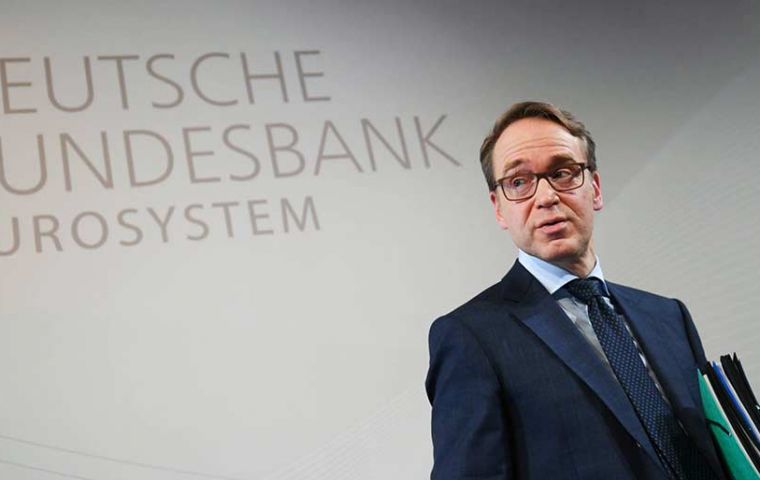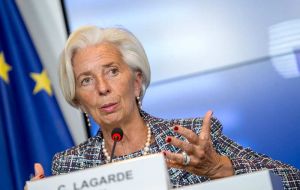MercoPress. South Atlantic News Agency
The president of powerful Bundesbak resigns after ten years in the post
 Weidmann said the Bundesbank had contributed with its analytical competence as well as its core convictions to the recently concluded review process
Weidmann said the Bundesbank had contributed with its analytical competence as well as its core convictions to the recently concluded review process  Christine Lagarde also praised the outgoing Weidmann, whom she described as “a good personal friend and on whose loyalty I could always count”
Christine Lagarde also praised the outgoing Weidmann, whom she described as “a good personal friend and on whose loyalty I could always count” The president of the all-powerful German central bank, Bundesbank Jens Weidmann announced he will be resigning from the position he has held since 2011, on 31 December 2021, for personal reasons. “I have come to the conclusion that more than 10 years is a good measure of time to turn over a new leaf – for the Bundesbank, but also for me personally,” Weidmann wrote in a letter to the Bank's staff.
In his words of thanks to the staff, Weidmann refers to the joint achievements: “The environment in which we operate has changed massively and the Bundesbank's tasks have grown. The financial crisis, the sovereign debt crisis and most recently the pandemic have led to decisions in politics and monetary policy that will have long-lasting effects. It has always been important to me that the Bundesbank's clear, stability-oriented voice remains clearly audible. With a great deal of expertise, the departments have contributed to the discussions on the right lessons to be learned from the crisis and on the framework of the monetary union. Important regulatory changes have been adopted. The reorganization of banking supervision in Europe has not only led to completely new supervisory structures at the ECB, but also to a strengthened role for the Bundesbank. The Bundesbank's new responsibilities in the area of financial stability also underline our central role when it comes to a functioning financial system.”
Weidmann thanked his colleagues in the ECB Governing Council under the leadership of Christine Lagarde for the open and constructive atmosphere in the sometimes difficult discussions of the past years and underlines the important, stabilizing role of monetary policy during the pandemic, as well as the successful conclusion of the strategy review as an important milestone in European monetary policy. Weidmann points out that the Bundesbank had confidently contributed with its analytical competence as well as its core convictions to the recently concluded review process. “A symmetrical, clearer inflation target has been agreed. Side effects and in particular financial stability risks are to be given greater attention. A targeted overshooting of the inflation rate was rejected,” Weidmann pointed out.
As to the future, much will depend on how this strategy is “lived” through concrete monetary policy decisions. “In this context, it will be crucial,” says Weidmann, “not to look one-sidedly at deflationary risks, but not to lose sight of prospective inflationary dangers either. A stability-oriented monetary policy will only be possible in the long run if the regulatory framework of the Monetary Union continues to ensure the unity of action and liability, monetary policy respects its narrow mandate and does not get caught in the wake of fiscal policy or the financial markets. This remains my firm personal conviction, as does the high importance of the independence of monetary policy.”
Weidmann also expressed special thanks to the members of the Executive Board. “Together, they had positioned the Bundesbank as a competent and agile institution that treated its staff with respect and acted transparently towards the public”.
The ECB president Christine Lagarde also praised the outgoing Weidmann, whom she described as “a good personal friend and on whose loyalty I could always count”. Lagarde underlined their productive relationship based on the joint commitment to furthering European unity, fulfilling the ECB’s price stability mandate, helping the euro area economy through the unprecedented crisis caused by the coronavirus, and stabilising the global economy shaken by the effects of the pandemic.
“While Jens had clear views on monetary policy I was always impressed by his search for common ground in the Governing Council, by his empathy for his Eurosystem colleagues, and his willingness to find a compromise. One of the many moments this became evident was in our work on the strategy review where he significantly contributed to its successful, unanimous agreement in the Governing Council” concluded the brief statement. .




Top Comments
Disclaimer & comment rulesCommenting for this story is now closed.
If you have a Facebook account, become a fan and comment on our Facebook Page!